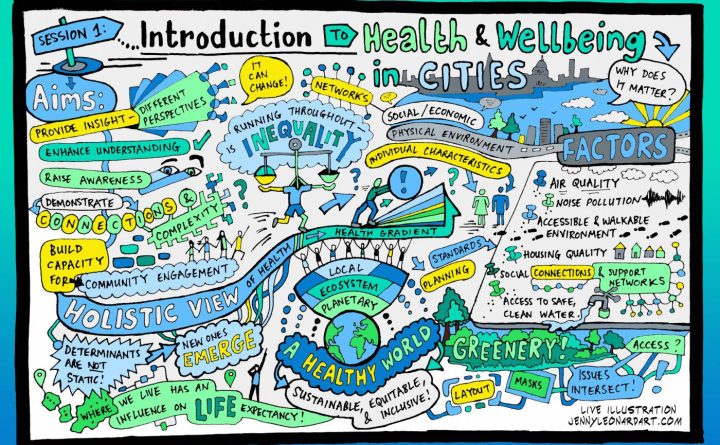Following on from our recent case study Authentic assessment on the Clinical Exercise and Physical Activity module, the Digital assessment team would like to share another example of authentic assessment at UCL.
BENV0056 Health and Wellbeing in Cities: Theory and Practice explores how the built environment affects health and wellbeing. The final assessment is a health impact assessment which focuses on a real-life case study (I.e. urban development, policy programme). As the module covers a lot of areas and has a cross discipline student cohort, module lead Dr Gemma Moore decided to put students into cross-discipline groups because ‘in real life that’s what happens’. In 2021-22 students worked with the Greater London Authority (GLA) as the external partner, undertaking a health impact assessment on the Designing London’s Recovery Programme.There are genuine issues that are thrown at the students mid-assessment and the ideas from the submissions are feedback to the external partner.
In the video below, Gemma explains her approach, feedback from students and her tips for applying experiential learning and authentic assessment.
To learn more you are welcome to view Gemma’s presentation A case study of engaged education assessments from UCL’s education conference 2022 or get in contact with her.
Gemma’s top tips for experiential learning
- Bring in voices other than your own within lectures and assessment, e.g. guest lecturers, practitioners, industry and community partners.
- Involve students in inter-disciplinary teams so they work with different perspectives and knowledges, and have a chance to reflect on their own.
- Consider assessments or activities which are mutually beneficial for students and external partners.
- Provide opportunities for students to receive feedback, including from external partners, that feeds forward into their summative assessment.
- Set really clear expectations and guidance for students (and external partners) especially if the assessment isn’t something they would typically be used to.
Want to incorporate authentic assessments in your programme?
Attend the Authentic Assessment workshop on 22 November 2022, 12:00 pm–1:00 pm at the UCL Arena Centre. The session with be co-facilitated by Richard Osborne and Digital Assessment Advisor (DAA) Eliot Hoving. You can book to attend the session from the Arena Centre training site.
